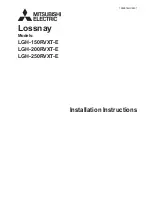
8
Subject to Technical Modifications of GES Energy Small and GES Energy Medium
Insulation of ducts in heated spaces
Genvex recommends as follows:
Supply and extract ducts:
In warm loft spaces the supply and extract channels must
be insulated with 50 mm insulation.
Supply and extract air ducts led through heated spaces in
dwellings do not require insulation. If the supply air duct
has cooling, bypass or earth heat exchanger installed it
must be insulated.
Fresh air and exhaust ducts:
In warm loft spaces and warm rooms in dwellings the fresh
and exthaust air ducts must be insulated with minimum 50
mm insulation. In addition, the insulation must be covered
externally with plastic film or aluminium foil in order to
avoid condensate in the insulation.
We recommend an insulation of 100 mm on the fresh air
duct when installing a earth heat exchanger.
Refer to your local distributor for guidance on national
insulation directives.
Reheating of supply air
As the counter current heat exchanger cannot extract all
the heat from the extract air and supply it to the supply air,
the supply air will be about 1-4°C colder than the room
temperature in the dwelling for the whole winter season.
If this lower supply temperature is insupportable during
cold periods, a water-based or electrical reheating surface
can be mounted for reheating the supply air up to room
temperature.
Water-based reheating surface
To protect the water-based reheating surface from frost
burst, a frost protection thermostat must be fitted to the unit
and the surface insulated. The frost protection thermostat
sensor is mounted behind the fins of the water-based
reheating surface. The sensor for controlling the motor
valve is mounted in the supply air channels approx. 500
mm downstream of the water-based reheating surface
in order not to be affected by the radiant heat from the
heating element. The water supply to the water-based
reheating surface must be executed by an authorised
plumbing and heating engineer.
Electrical reheating surface
The sensor for controlling the electrical heating surface
is mounted in the supply air channel approx. 500 mm
downstream of the electrical reheating surface in order
not to be affected by the radiant heat from the heating
element.



































